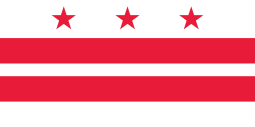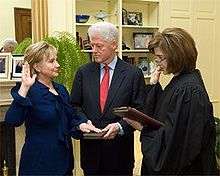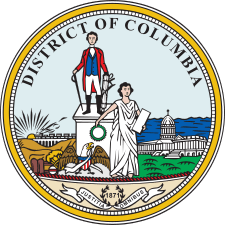District of Columbia Court of Appeals
The District of Columbia Court of Appeals is the highest court of the District of Columbia. Established in 1970, it is equivalent to a state supreme court, except that its authority is derived from the United States Congress rather than from the inherent sovereignty of the states. The court is located in the former District of Columbia City Hall building at Judiciary Square. The D.C. Court of Appeals should not be confused with the District's federal appellate court, the United States Court of Appeals for the District of Columbia Circuit. The D.C. Court of Appeals and the Superior Court of the District of Columbia comprise the District's local court system.
| District of Columbia Court of Appeals | |
|---|---|
The District of Columbia Court of Appeals is located in the former D.C. City Hall, a National Historic Landmark. | |
| Established | 1970 |
| Location | District of Columbia City Hall, Judiciary Square, Washington, DC |
| Composition method | Presidential nomination with Senate confirmation |
| Authorized by | Derived from the United States Congress |
| Appeals to | Supreme Court of the United States (in matters of federal law only) |
| Judge term length | 15 years |
| Number of positions | 9 |
| Website | DCCourts.gov |
| Chief judge | |
| Currently | Anna Blackburne-Rigsby |
| Since | March 17, 2017 |
District of Columbia
|
|---|
 |
| This article is part of a series on the politics and government of District of Columbia |
|
Governance
|
|
Elections
|
|
Powers
As the court of last resort for the District of Columbia, the Court of Appeals is authorized to review all final orders, judgments, and specified interlocutory orders of the associate judges of the Superior Court of the District of Columbia, as well as decisions of certain D.C. agencies. The court also has jurisdiction to review decisions of administrative agencies, boards, and commissions of the District government, as well as to answer questions of law presented by the Supreme Court of the United States, a United States court of appeals, or the highest appellate court of any state. As authorized by Congress, the court reviews proposed rules of the trial court and develops its own rules for proceedings.
Cases before the court are determined by randomly selected three-judge divisions, unless a hearing or rehearing before the court sitting en banc (with all judges present) is ordered. A hearing or rehearing before the court sitting en banc may be ordered by a majority of the judges in regular active service, generally only when consideration by the full court is necessary to maintain uniformity of its decisions, or when the case involves a question of exceptional importance. The en banc court consists of the nine judges of the court in regular active service, except that a retired judge may sit to rehear a case or controversy if he or she heard the original hearing. The Chief Judge may designate and assign temporarily one or more judges of the Superior Court of the District of Columbia to serve on the District of Columbia Court of Appeals when required.

(January 21, 2009)
Members of the court are empowered to adjudicate the oath of office ceremony for the executive cabinet of the President.
In the exercise of its inherent power over members of the legal profession, the court established the District of Columbia Bar and has the power to approve the rules governing attorney disciplinary proceedings. The court also reviews the rules of professional conduct and has established rules governing the admission of members of the District of Columbia Bar and the resolution of complaints concerning the unauthorized practice of law in the District of Columbia.
Judges
The court consists of a chief judge and eight associate judges. The court is assisted by the service of retired judges who have been recommended and approved as senior judges. Despite being the District's local appellate court, judges are appointed by the President of the United States and confirmed by the U.S. Senate for 15-year terms.[1]
Active judges
As of January 6, 2020:
| Judge | First term began | Current term ends | Chief |
|---|---|---|---|
| Anna Blackburne-Rigsby[2] | November 17, 2006[3] | 2021 | March 18, 2017[4] – present |
| Stephen H. Glickman[5] | 1999[5] | 2029 | —— |
| John R. Fisher[6] | January 6, 2006[7] | 2021 | —— |
| Phyllis D. Thompson[8] | 2006[8] | 2021 | —— |
| Corinne A. Beckwith[9] | December 2011 | 2026 | —— |
| Catharine F. Easterly[10] | February 10, 2012 | 2027 | —— |
| Roy W. McLeese III[11] | September 21, 2012 | 2027 | —— |
| Joshua Deahl | January 6, 2020 | 2035 | —— |
| vacant | —— | —— | —— |
Senior judges
The senior judges are Eric T. Washington, Frank Q. Nebeker, John M. Ferren, John M. Steadman, and Vanessa Ruiz.[12]
Vacancies and pending nominations
| Seat | Seat last held by | Vacancy reason | Date of vacancy | Nominee | Date of nomination |
|---|---|---|---|---|---|
| — | Kathryn A. Oberly | Retirement | November 1, 2013 | John P. Howard III | June 25, 2020 |
| — | John R. Fisher | August 22, 2020[13] | Vijay Shanker |
Former judges
| Judge | Born–died | Active service | Chief Judge | Senior status | Appointed by | Reason for termination |
|---|---|---|---|---|---|---|
| Catherine B. Kelly | 1917–1995 | 1967–1983 | – | – | Lyndon B. Johnson | Resignation
|
| Austin L. Fickling | 1914–1977 | 1968–1977 | Death
| |||
| John W. Kern III | 1928–2018 | 1968–1984 | 1984–2012 | Retirement
| ||
| George R. Gallagher | 1915–2007 | 1968–1981 | 1981–2001 | Retirement
| ||
| Hubert Pair | 1904–1999 | 1970–1974 | 1975–1988 | Richard Nixon | Death
| |
| Gerard D. Reilly | 1906–1995 | 1970–1976 | 1972–1976 | 1976–1995 | Death
| |
| J. Walter Yeagley | 1909–1990 | 1970–1979 | – | 1979–1984 | Retirement
| |
| Stanley S. Harris | 1927–present | 1972–1982 | – | Appointed United States Attorney for the District of Columbia
| ||
| Julia Cooper Mack | 1920–2014 | 1975–1989 | 1989–2001 | Gerald Ford | Retirement
| |
| Theodore R. Newman Jr. | 1934–present | 1976–1991 | 1976–1984 | 1991–2016 | Retirement
| |
| William C. Pryor | 1932–present | 1979–1988 | 1984–1988 | 1988–2019 | Jimmy Carter | Retirement
|
| James A. Belson | 1931–present | 1981–1991 | – | 1991–2017 | Ronald Reagan | Retirement
|
| John A. Terry | 1933–present | 1982–2006 | 2006–2016 | Retirement
| ||
| Judith W. Rogers | 1939–present | 1983–1994 | 1988–1994 | – | Appointed to the United States Court of Appeals for the District of Columbia Circuit
| |
| Frank E. Schwelb | 1932–2014 | 1988–2006 | – | 2006–2014 | Retirement
| |
| Michael W. Farrell | 1938–present | 1989–2008 | – | 2009–2019 | George H. W. Bush | Retirement
|
| Annice M. Wagner | 1937–present | 1990–2005 | 1994–2005 | 2005–2013 | Retirement
| |
| Emmet G. Sullivan | 1947–present | 1991–1994 | – | – | Appointed to the United States District Court for the District of Columbia
| |
| Warren R. King | 1937–present | 1991–1998 | 1998–2016 | Retirement
| ||
| Inez Smith Reid | 1937–present | 1995–2011 | 2011–2017 | Bill Clinton | Retirement
| |
| Noël A. Kramer | 1945–2018 | 2005–2011 | – | George W. Bush | Retirement
| |
| Kathryn A. Oberly | 1950–present | 2009–2013 | Resignation |
See also
References
- "Judicial Selection in the States: District of Columbia". American Judicature Society. Retrieved 2012-09-12.
- Official Bio of Judge Blackburne-Rigsby
- Former Superior Court Judge to become Judge on D.C. Court of Appeals
- Judge Blackburne-Rigsby Named Chief Judge of the D.C. Court of Appeals
- "Official Bio of Judge Glickman" (PDF). Archived from the original (PDF) on 2015-09-23. Retrieved 2015-06-14.
- "Official Bio of Judge Fisher" (PDF). Archived from the original (PDF) on 2012-02-06. Retrieved 2015-06-14.
- John Fisher to Be Sworn In as Associate Judge on D.C. Court of Appeals This Friday
- "Official Bio of Judge Thompson" (PDF). Archived from the original (PDF) on 2017-06-26. Retrieved 2015-06-14.
- Official Bio of Judge Beckwith
- Official Bio of Judge Easterly
- "Official Bio of Judge McLeese" (PDF). Archived from the original (PDF) on 2015-09-23. Retrieved 2015-06-14.
- District of Columbia Court of Appeals Judges
- "Notice of Judicial Vacancies on the District of Columbia Court of Appeals". jnc.dc.gov. December 6, 2019. Retrieved June 26, 2020.
External links
- District of Columbia Court of Appeals – Official webpage of the DC Court of Appeals, part of the DC Courts' website.
- "District of Columbia", Caselaw Access Project, Harvard Law School, OCLC 1078785565,
Court decisions freely available to the public online, in a consistent format, digitized from the collection of the Harvard Law Library
